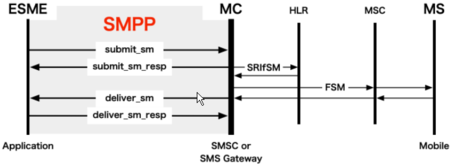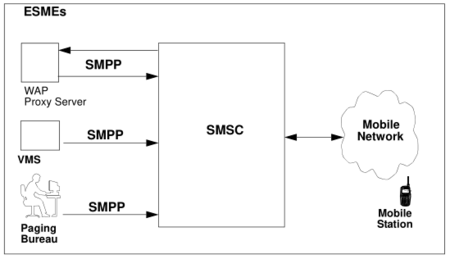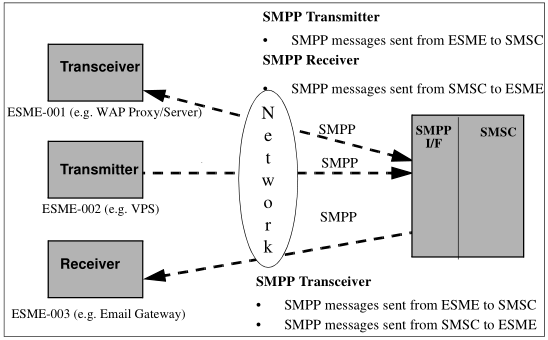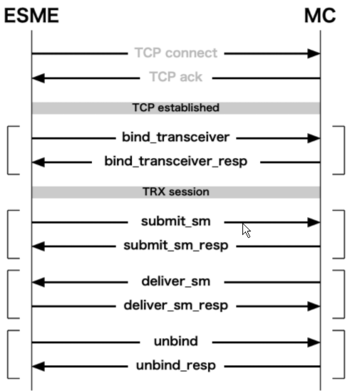Difference between revisions of "CSharp:SMS - SMPP"
From Aino Wiki
(→Helper C#) |
(No difference)
|
Latest revision as of 16:56, 23 June 2021
Contents
Teoria
Come da SMPP.org:
Il protocollo SMPP è un protocollo industriale standard aperto progettato per fornire una interfaccia di comunicazione flessibile all'invio di brevi messaggi di testo (SMS) tra un centro messaggi (SMSC = Short Message Service Centre) ed entità short message (ESMEs ) poste al di fuori della rete mobile.
Esempi di applicazioni ESME posson essere: allerta di email ricevute da VPS (Voice Processing System), servizi informazioni, applicazioni gestionali che usinno SMSC per determinare la posizione di veicoli servizio o notificarne la vicinanza, applicazioni di telemetria, WAP Proxy Server. Ovvero:
Definizione del protocollo
L'SMPP è basato sullo scambio di richieste (request) e risposte (response) di unità di protocollo (protocol data units= PDUs) tra l'ESME e l'SMSC sfruttando il sottostante protocollo TCP/IP o connessione di rete X.25.
Il protocollo SMPP definisce:
- un insieme di operazioni e associati PDUs (Protocol Data Units) per lo scambio di messaggi SMS tra ESME e SMSC.
- i dati che le applicazioni ESME possono scambiarsi con un SMSC durante le operazioni SMPP.
NOTA
- Ogni operazione SMPP deve consistere in una request PDU e associata response PDU. L'entità ricevente deve restituire l'associata SMPP response ad una request SMPP PDU.
- La sola eccezione alla regola è: l'alert_notification PDU per cui non c'è alcuna response in uscita.
Lo scambio di messaggi tra un ESME e SMSC attraverso l'SMPP può esser classificato in 3 gruppi di transazioni come segue:
- messaggi inviati da ESME (Transmitter - TX) a SMSC; richiede autenticazione in qualità di trasmettitore.
- messaggi inviati da SMSC a ESME (Receiver - RX);
- messaggi inviati da ESME (Transceiver - TRX) a SMSC e messaggi inviati da SMSC a ESME (Transceiver).
Descrizione della sessione SMPP
The SMPP protocol is a set of operations, each one taking the form of a request and response Protocol Data Unit (PDU) containing an SMPP command. For example, if an ESME wishes to submit a short message, it may send a submit_sm PDU to the MC. The MC responds with a submit_sm_resp PDU, indicating the success or failure of the request. Likewise, if an MC wishes to deliver a message to an ESME, it may send a deliver_sm PDU to an ESME, which in turn responds with a deliver_sm_resp PDU as a means of acknowledging the delivery.
Le operazioni sono classificate nei seguenti gruppi:
- Session Management - These operations are designed to enable the establishment of SMPP sessions between an ESME and MC and provide means of handling unexpected errors.
- Message Submission - These operations are explicitly designed for the submission of messages from ESME(s) to the MC.
- Message Delivery - These operations enable an MC to deliver messages to the ESME.
- Message Broadcast - These operations are designed to provide Cell Broadcast service within a Message Centre.
- Ancillary Operations (Operazioni ausiliarie) - These operations are designed to provide enhanced features such as cancellation, query or replacement of messages.
Implementazione teorica
Esempio SMPP PDU, invio SMS
Da [smpp.org]
submit_sm
submit_sm_resp
Comandi
[smpp.org]
Codici di errore
[smpp.org]
Helper C#
Esempio con Jamaa
Considerando che il seguente codice ancora non l'ho testato, segue la classe helper consistene in un collage di esempi presi dalla Wiki della libreria Jamaa:
using JamaaTech.Smpp.Net.Client; using JamaaTech.Smpp.Net.Lib; using NLog; using System; using System.Collections.Generic; using System.Linq; using System.Text; using System.Threading.Tasks; namespace XXX_Common { public class SMPPHelper { //DOC: https://github.com/AdhamAwadhi/JamaaSMPP/wiki public SmppClient Client = new SmppClient(); public string TextSMSDelivered = string.Empty; private static readonly Logger m_logger = LogManager.GetCurrentClassLogger(); /// <summary> /// Instaura una connessione al server SMSC (Short Message Service Centre) /// </summary> /// <param name="systemID"></param> /// <param name="password"></param> /// <param name="port"></param> /// <param name="host"></param> /// <param name="systemType"></param> /// <param name="defaultServiceType"></param> public SMPPHelper(string systemID, string password, int port , string host, string systemType, string defaultServiceType) { SmppConnectionProperties properties = Client.Properties; properties.SystemID = systemID; // "mysystemid"; properties.Password = password; // "mypassword"; properties.Port = port; // 2034; //IP port to use properties.Host = host; // "196.23.3.12"; //SMSC host name or IP Address properties.SystemType = systemType; // "mysystemtype"; properties.DefaultServiceType = defaultServiceType; // "mydefaultservicetype"; //Handle the SmppClient.ConnectionStateChanged event to receive notifications //when connection status changes Client.ConnectionStateChanged += Client_ConnectionStateChanged; //Resume a lost connection after 30 seconds Client.AutoReconnectDelay = 3000; //Send Enquire Link PDU every 15 seconds Client.KeepAliveInterval = 15000; //Start smpp client Client.Start(); } private void Client_ConnectionStateChanged(object sender, ConnectionStateChangedEventArgs e) { m_logger.Debug("SMPP connection status changes to '{0}'.", e.CurrentState); switch (e.CurrentState) { case SmppConnectionState.Closed: //Connection to the remote server is lost //Do something here e.ReconnectInteval = 60000; //Try to reconnect after 1 min break; case SmppConnectionState.Connected: //A successful connection has been established break; case SmppConnectionState.Connecting: //A connection attemp is still on progress break; } } public string SendSMS_Synchro(string destinationNr, string sourceAddress, string smsText) { string strErrorMsg = string.Empty; TextMessage msg = new TextMessage(); int timeOut = 0; //????????????? try { m_logger.Debug("Sending SMS to {0}, sourceAddress='{1}'", destinationNr, sourceAddress); msg.DestinationAddress = destinationNr; // "255455388333"; //Receipient number msg.SourceAddress = sourceAddress; // "255344338333"; //Originating number msg.Text = smsText; msg.RegisterDeliveryNotification = true; //I want delivery notification for this message Client.MessageDelivered += Client_MessageDelivered; //Per Notifica e verifica del messaggio inviato //Default encdoing: System.Text.Encoding.BigEndianUnicode //But if you like UTF8: //Client.SmppEncodingService = new SmppEncodingService(System.Text.Encoding.UTF8); //Client.SendMessage(msg, timeOut); Client.SendMessage(msg); } catch (Exception ex) { m_logger.Error(ex); strErrorMsg = string.Format("Error sending to '{0}':\r\n{1}", destinationNr, ex.Message); } return strErrorMsg; } public string SendSMS_Asynchro(string destinationNr, string sourceAddress, string smsText) { string strErrorMsg = string.Empty; TextMessage msg = new TextMessage(); try { msg.DestinationAddress = destinationNr; // "255455388333"; //Receipient number msg.SourceAddress = sourceAddress; // "255344338333"; //Originating number msg.Text = smsText; // "Hello, this is my test message!"; msg.RegisterDeliveryNotification = true; //I want delivery notification for this message // ??? SmppClient client = GetSmppClient(); Client.BeginSendMessage(msg, SendMessageCompleteCallback, Client); } catch (Exception ex) { m_logger.Error(ex); strErrorMsg = string.Format("Error sending to '{0}':\r\n{1}", destinationNr, ex.Message); } return strErrorMsg; } #region Private methods private void Client_MessageDelivered(object sender, MessageEventArgs e) { try { TextMessage msg = e.ShortMessage as TextMessage; //parse msg.Text for more details m_logger.Debug(msg.Text); TextSMSDelivered = msg.Text; } catch (Exception ex) { m_logger.Error(ex); } } private void SendMessageCompleteCallback(IAsyncResult result) { try { SmppClient client = (SmppClient)result.AsyncState; client.EndSendMessage(result); } catch (Exception ex) { m_logger.Error(ex); } } #endregion } }
Mappa e Link
C# | Librerie di terze parti PlugIn
Visual Studio | MS SQL | Dizionario
Parole chiave:







